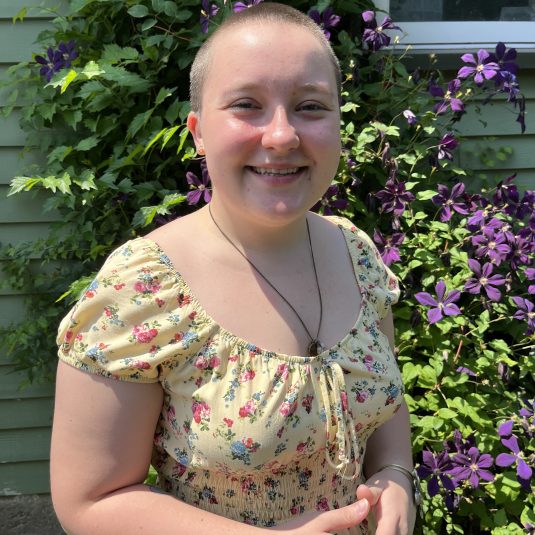
Curiosity often starts with a feeling, a yearning to know more, more about history, more
about yourself, more about this world and its society and culture that grows around us. What
starts out as curiosity, though, can lead to a whole new set of questions and skills.
Casey A’Hearn, a second year MA student in our Religious Studies department, has seen
their curiosity transform. Casey earned their undergrad degree in Religion at Rochester
University, in New York, though they started out with a goal of becoming a forensic psychologist.
Casey quickly realized that forensic psychology did not satisfy the curiosity that they had for the
world around them. Like many undergrad students in this department, their eventual career in
Religious Studies started with a simple recommendation, “why don’t you try out this class.” For
Casey, that class was Introduction to Religious Studies. While at Rochester Casey cultivated their
curiosity about religion working with various professors, including Aaron Hughes, who
encouraged them to apply to UA’s Religion in Culture MA program, an option that originally was
not on Casey’s radar. Because they enrolled at the University of Alabama, they have been able
to pursue curiosities in ways that diversify their academic viewpoints and resume. Currently
Casey is working on an MA project, which is based on the differences (if any) between Mormon
scriptures.
In addition to pursuing their own curiosity, the MA program here at UA has helped them
learn to market themselves after graduation so that they can pursue a range of careers,
considering the reality that a faculty position is not guaranteed after completing graduate work.
One way that Casey has developed this diversity of skills is through digital work. Casey has
contributed to faculty projects in the department and has employed digital tools in their own
research and presentation.
Casey is also furthering these skills as a HASTAC Fellow. HASTAC (which stands for
Humanities, Arts, Sciences, Technology Alliance and Collaboratory) is an organization of scholars
in various fields who wish to integrate the use of technology into their work. Casey describes
HASTAC as a networking device as it helps them interact with scholars and other MA or PhD
students who have similar ideas. The idea of collaboration is one of Casey’s additional passions
as a scholar, and HASTAC facilitates opportunities to collaborate. HASTAC helps scholars explore
multiple opportunities using technology within the humanities and extending their skills into
new areas. The goal is to help technology play a larger role in their discipline.
An environment of curiosity continues to motivate Casey. They will graduate from UA in
May with their MA in Religious Studies, and they wish to go into a PhD program soon
afterwards. Casey hopes to be able to enter the academic world eventually and there be able to
cultivate a safe place for curiosity. Recognizing that rote memorization and repetitive schooling
can kill creativity, Casey’s passion for teaching extends beyond regurgitating information and
works to inspire a passionate curiosity in students.
But what does this have to do with a degree in Religious Studies?
People often enter the academic study of religion because of questions and curiosities
that we have about the world around us. As we cultivate these curiosities, they can lead to new
questions and curiosities, as we learn more about how groups and texts work. The skills that we
hone as we pursue various questions extend well beyond our initial curiosities and prepare us
for a wide range of opportunities. For Casey, questions about how best to analyze and present
particular texts have led to additional skills in the use of technology, that has opened even more
doors for them
This series highlights the range of accomplishments that students in Religious
Studies achieve while at the Capstone and in their lives after graduation. We all hear
questions like, “What are you going to do with a Religious Studies degree?” As this
series makes clear, the skills that students develop in Religious Studies, including
critical thinking, interacting with diverse viewpoints, social analysis, and the ability to
communicate to multiple audiences, contribute to a broad range of activities and
careers.